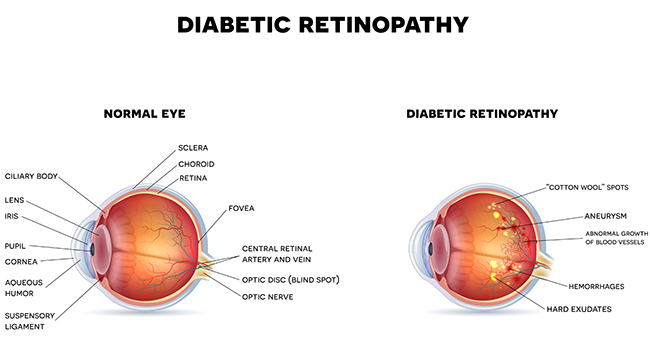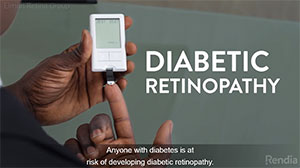Treating Diabetic Retinopathy in Baltimore
Also serving Pikesville, Catonsville, Glen Burnie, & Rosedale
Developing a chronic condition like diabetes impacts your life and health. When you notice changes to your vision after a diagnosis of diabetes from your medical doctor, it may relate to the condition. Treating diabetic retinopathy requires an understanding of the underlying causes of the condition and the possible solutions that may reduce the risk of further damages to your eyes.

What is Diabetic Retinopathy?
 Diabetic retinopathy is a condition related to the blood vessels in the retina. When you have high blood glucose levels, it may cause damage to the retina due to the changes in the blood vessels. Over time, you notice changes to your vision or a loss of vision.
Diabetic retinopathy is a condition related to the blood vessels in the retina. When you have high blood glucose levels, it may cause damage to the retina due to the changes in the blood vessels. Over time, you notice changes to your vision or a loss of vision.
Depending on the severity of damage to the retina, professionals at the Elman Retina Group provide treatment solutions to address the situation. We focus on the type of damage to your eyes and the possible solutions based on your situation and goals.
Impact on Your Vision
The impact of diabetic retinopathy on your vision and eyes will vary based on the severity of the situation. In early stages, we may prevent or limit vision loss by identifying the problem and taking measures to slow the progression of the condition. Unfortunately, you may not notice a problem until you begin losing your vision.
It is not possible to cure the damage to your eyes. At our clinic, we focus on slowing the progression of the condition through appropriate treatment strategies. We evaluate the severity of the damage to your retinas and then recommend a solution after determining the options for your situation. We may recommend adjustments to your normal activities as well as various corrective solutions based on your retinas and the damage to the area.
Treatment Options in Our Clinic
The treatments we offer for diabetic retinopathy depend on your needs. We may recommend surgical procedures to reduce the risk of further damages to your retina. Laser surgery may help when the damage to your retina is limited and has not yet progressed to a severe point. We may also suggest the surgical removal of the vitreous gel if you notice changes to your vision, but the retina is not damaged or has limited damages.
In certain situations, we use anti-inflammatory medications as an injection to reduce the inflammation contributing to the damages. The medication helps slow the progression of the condition when we notice inflammation during routine exams.
The key to preventing a loss of vision is regular screenings. If you have diabetes, then we recommend visiting a professional for exams at least once in six months or more regularly when we have concerns about your eyes. Early detection is the key to treating diabetic retinopathy and slowing the progression of the condition.
Diabetic Retinopathy FAQs
Is diabetic retinopathy common?
Diabetic retinopathy is the leading cause of blindness for people with diabetes.
Can diabetic retinopathy be avoided?
The best way to lower your risk is to keep your blood sugar levels, blood pressure and cholesterol controlled. Also, seeing our eye doctors regularly for exams makes it easier to catch diabetic retinopathy in its early stages, before it significantly affects vision.
How do I know if I have diabetic retinopathy?
Diabetic retinopathy can cause the following signs and symptoms:
- Blurry or fluctuating vision
- Floaters or flashes of light
- Dark, shadowy or blind spots in the visual field
- Difficulty perceiving colors
The early stages of diabetic retinopathy may cause no symptoms at all. This is why our doctors encourage regular eye exams, even if you are not experiencing any symptoms. Contact us to see if you have diabetic retinopathy.
How is diabetic retinopathy treated?
Treating diabetic retinopathy depends on what stage the disease is in.
In the early stages of the disease, improving diabetes management through medication and regular doctor visits may help slow the progression.
As diabetic retinopathy advances, medical, laser or surgical treatment may be needed.
Medications can be injected into the eye to inhibit the growth and development of abnormal new blood vessels.
Lasers can be used to target and seal off the blood vessels leaking fluid into the retina. However, laser treatment cannot restore vision you have already lost — it can only preserve the sight you have. The number of treatments needed depends on the severity of the disease and how bad the damage is.
In the later stages of the disease, when the blood vessels have leaked blood into the vitreous, a vitrectomy may be needed. The surgical procedure removes the vitreous and blood and replaces the vitreous with a saline fluid that helps the eye maintain its normal pressure and shape.
Who is at greatest risk of getting diabetic retinopathy?
Diabetics who have fluctuating blood sugar levels or a long-term history of the disease are more likely to develop diabetic retinopathy.
What are the different types of diabetic retinopathy?
Diabetic retinopathy is categorized as proliferative or non-proliferative.
Non-proliferative diabetic retinopathy is the earlier stage of the disease. At this point, existing blood vessels in the retina have weakened or become blocked.
Proliferative diabetic retinopathy is the more advanced stage of the disease. At this point, existing blood vessels are blocked and new, irregular blood vessels form and leak blood and other fluids.
What complications can diabetic retinopathy cause?
The abnormal blood vessels that grow due to proliferative diabetic retinopathy can cause scarring in the retina or retinal detachment (i.e., the retina pulls away from its normal position against the back wall of the eye). The blood vessels can also leak blood into the vitreous humor, which the clear, jelly-like substance filling the back of the eye, causing blurry or distorted vision due to a vitreous hemorrhage.
Can diabetic retinopathy cause blindness?
Yes. If left untreated, diabetic retinopathy can cause total blindness.
Developing a chronic health condition impacts your life by causing complications in your health. When you have diabetes, you want regular screenings for diabetic retinopathy to limit possible complications. To learn more about treating retinopathy, call us today.



